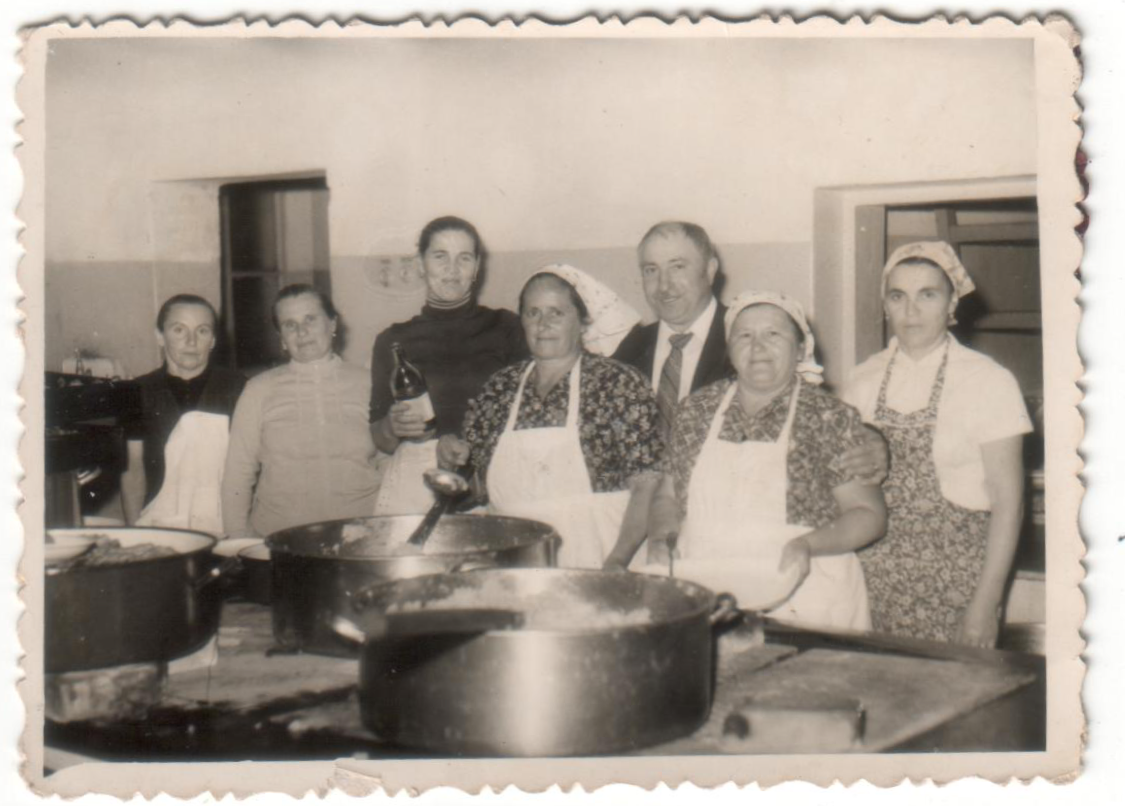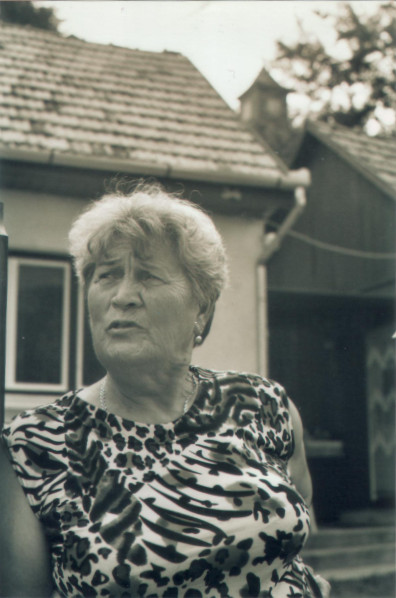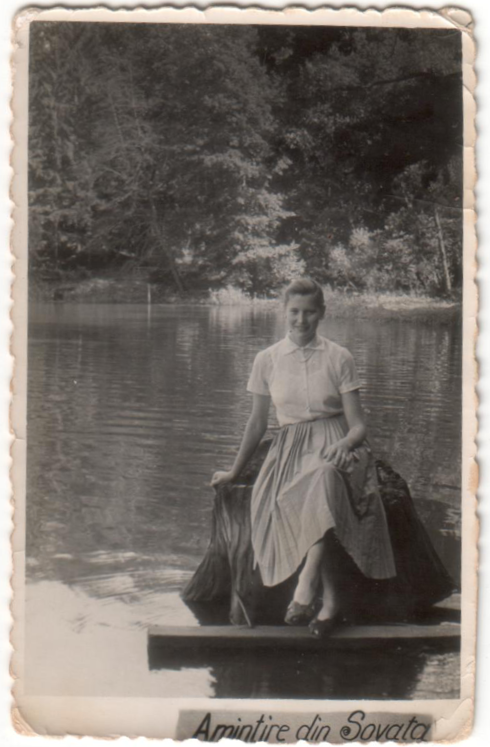Transylvania: memories of pickled gherkins
For families who emigrated from Eastern Europe, affection and memory are also handed down through culinary inheritances. Distant and recent memories of a Transylvanian grandmother intertwine remembering Erzsebet’s passion for coffee and her lost pickled gherkins recipe

Transilvania-memoria-di-cetriolini-in-salamoia
Erzsebet Nagy in the kitchen of one of the hotels where she worked – photo Sielke Kelner archive
The exchange of delicacies from the country of origin to the host country and vice versa is an established tradition in my family. After all, it is a custom of many other families who immigrated to Italy from Eastern Europe. Two or three times a year, it does not matter when as long as the hot summer temperatures are avoided, I receive the package from Romania, entrusted by my father to a small company of road hauliers who, starting from Iasi, in the Moldavian region of Romania, and crossing Transylvania, travel the approximately 2000 kilometres that separate us once or twice a week. Dozens of jars of blueberry and raspberry jam, zacusca, mixed pickles, pickled gherkins, sauerkraut, fir bud syrups reach their destination. And then raspberry and blueberry syrups; nuts, lard, sausages, meat in lard, and coarsely ground cornmeal. The beloved palinka, the Transylvanian distillate, the most prized is that of plums. All homemade by my father or this or that aunt, this or that cousin.
In return, my father and aunts receive parcels of Italian specialties: panettone, pandoro, colombe depending on the season, olive oil, parmesan, rigatoni and tortellini, canned tuna. And especially coffee. Italian coffee is what everyone wants to have in their pantry. When we travel by plane, and we need to optimise the space available in our luggage, we pack at least one 250 g pack of coffee for each relative.
It is not just a drink. Coffee is still used as a product of exchange and favours, a legacy of a Cold War practice that recognised Western products as informal currencies of a parallel economy based on barter. In the run-up to the democratic transition, Nescafé had established itself as the quintessential Western coffee. Available not on Romanian grocery shelves, but on the black market.
Romanian historian Lucian Boia recalls how in the 1980s, Western consumer products had become currencies of a clandestine economic circuit. The hard currency was made up of the famous Kent cigarettes. In the context of a dramatic economic crisis characterised by the chronic shortage of basic necessities and by a hyper-bureaucratic and corrupt system, a stick of Kent guaranteed a medical treatment, a school promotion. The cigarettes were not even consumed by those who received them, more frequently they passed from hand to hand, from the doctor, to the teacher, to the public official. Beyond their market value, Western products transcended their use, they were symbols of a prosperous and ideal society, an allegory of the free world.
And yet, coffee was by far the product most desired by my grandmother Erzsebet, for all Erzsi. First, my grandmother loved to drink coffee. In my memories she always has a steaming cup in her hand, prepared in a Turkish pot. In the 1980s, when nothing but chicory coffee was on Romanian shelves, my grandmother bought bags of green coffee beans on the black market. She toasted and ground them herself. When my family and I emigrated to Italy in the early 1990s, my grandmother got to know Italian coffee, and Lavazza soon became her favorite. My grandmother stocked her pantry, stacking the small packs of Italian coffee on top of each other. The amount we sent home was never enough. During one of our last visits, we packed ten kilograms of coffee in our suitcases all intended for her, a quantity which as always was deemed insufficient. Grandma did not just drink coffee. She offered the packets of coffee to make sure that the dentist fixed her dentures well, and that the public official delivered that cadastral plan that she had requested months before…
Her pragmatism was not affected by the pain that afflicted her body when, in August 2020, hospitalised for a terminal illness, she counted how many kilos of coffee she needed so that she could distribute them to doctors and nurses of the hospital to ensure adequate care.
Third of fourteen children, born in 1941 into a family of modest peasants on the top of a wooded mountain overlooking the Transylvanian city of Sovata, in one of the three districts that still today in Romania host the seclera minority, my grandmother was a woman forged by the hardships of her generation. The numerous traumas that marked her childhood and adolescence made her a woman who did not like to express her affection and wanted to free herself from poverty most of all. She had started working at the age of 14 for a wealthy Hungarian Jewish family in Cluj, to then return to work in her hometown and complete her studies. Her determination allowed her, in the 1970s, to manage the kitchens of the hotel restaurants in our beautiful town, which is crowded with tourists in the summer.
My grandmother was the undisputed matriarch of our family. Instead of treating me as her first grandchild, she raised me as her third daughter, making it hard to meet her expectations. Yet, beyond the harshness of her tones, my grandmother was a very witty woman, whose puns bordered on insolence. Sometimes mischievous jokes, more often tinged with dark humour which made us all giggle.
Grandma died during a year that was difficult for everyone. One of those fulminating and very painful ailments for which doctors say there is nothing to be done took her away. She is gone and I have little left of her. Far away from Transylvania, I still have a pair of earrings and a jar of pickled gherkins, which arrived with the autumn 2020 package. A little over two years have passed, but I still keep that last jar of pickled gherkins because I do not dare to open it, for fear that once they are eaten, even the sound of her irreverent laughter disappears.
Her gherkins were famous in the family. After unscrewing the lid of the jar, one could taste the still crunchy gherkins, with sour notes due to the vinegar, with a spicy tip due to the mustard seeds and horseradish and a sweet one, due to that hint of sugar added to brine; they smelled of dill. Her gherkins were as famous as her reserve when she was asked how she prepared them. She has remained the only custodian of a recipe that she never wanted to share with anyone. After all, she was an excellent and competitive cook, a competition that spared no one. Her recipe has not made it to us, yet another joke. As in the past, to recover the secrets of the family kitchens I turned to the aunts. Apparently, her younger sister Anna prepares pickled gherkins according to a similar recipe.
Pickled gherkins, Nagy family recipe
Ingredients:
Gherkins 2 kg
2 liters of water
1 liter of vinegar
2 tablespoons of salt
2 tablespoons of sugar
Horseradish peeled and cut into strips
Dill
Mustard seeds
Black peppercorns
Whole peeled garlic
In a large saucepan, boil 1 liter of water, ½ liter of vinegar, 1 tablespoon of salt and 1 tablespoon of sugar. When it comes to a boil, add the whole gherkins and boil them for 10 minutes. Drain them, and throw away the cooking water. Repeat the first part of the procedure putting the same doses of water, vinegar, salt and sugar in the pot. While the liquid reaches the boil, arrange the previously drained gherkins in the jars. Add the smells. Place a steel spoon in the centre of each jar to prevent damage to the glass, and cover the gherkins with the cooking liquid. Screw the caps on the jars and store them in a warm place, covering them with rags and rugs so that they cool down slowly.
Featured articles
- Take part in the survey
Transylvania: memories of pickled gherkins
For families who emigrated from Eastern Europe, affection and memory are also handed down through culinary inheritances. Distant and recent memories of a Transylvanian grandmother intertwine remembering Erzsebet’s passion for coffee and her lost pickled gherkins recipe

Transilvania-memoria-di-cetriolini-in-salamoia
Erzsebet Nagy in the kitchen of one of the hotels where she worked – photo Sielke Kelner archive
The exchange of delicacies from the country of origin to the host country and vice versa is an established tradition in my family. After all, it is a custom of many other families who immigrated to Italy from Eastern Europe. Two or three times a year, it does not matter when as long as the hot summer temperatures are avoided, I receive the package from Romania, entrusted by my father to a small company of road hauliers who, starting from Iasi, in the Moldavian region of Romania, and crossing Transylvania, travel the approximately 2000 kilometres that separate us once or twice a week. Dozens of jars of blueberry and raspberry jam, zacusca, mixed pickles, pickled gherkins, sauerkraut, fir bud syrups reach their destination. And then raspberry and blueberry syrups; nuts, lard, sausages, meat in lard, and coarsely ground cornmeal. The beloved palinka, the Transylvanian distillate, the most prized is that of plums. All homemade by my father or this or that aunt, this or that cousin.
In return, my father and aunts receive parcels of Italian specialties: panettone, pandoro, colombe depending on the season, olive oil, parmesan, rigatoni and tortellini, canned tuna. And especially coffee. Italian coffee is what everyone wants to have in their pantry. When we travel by plane, and we need to optimise the space available in our luggage, we pack at least one 250 g pack of coffee for each relative.
It is not just a drink. Coffee is still used as a product of exchange and favours, a legacy of a Cold War practice that recognised Western products as informal currencies of a parallel economy based on barter. In the run-up to the democratic transition, Nescafé had established itself as the quintessential Western coffee. Available not on Romanian grocery shelves, but on the black market.
Romanian historian Lucian Boia recalls how in the 1980s, Western consumer products had become currencies of a clandestine economic circuit. The hard currency was made up of the famous Kent cigarettes. In the context of a dramatic economic crisis characterised by the chronic shortage of basic necessities and by a hyper-bureaucratic and corrupt system, a stick of Kent guaranteed a medical treatment, a school promotion. The cigarettes were not even consumed by those who received them, more frequently they passed from hand to hand, from the doctor, to the teacher, to the public official. Beyond their market value, Western products transcended their use, they were symbols of a prosperous and ideal society, an allegory of the free world.
And yet, coffee was by far the product most desired by my grandmother Erzsebet, for all Erzsi. First, my grandmother loved to drink coffee. In my memories she always has a steaming cup in her hand, prepared in a Turkish pot. In the 1980s, when nothing but chicory coffee was on Romanian shelves, my grandmother bought bags of green coffee beans on the black market. She toasted and ground them herself. When my family and I emigrated to Italy in the early 1990s, my grandmother got to know Italian coffee, and Lavazza soon became her favorite. My grandmother stocked her pantry, stacking the small packs of Italian coffee on top of each other. The amount we sent home was never enough. During one of our last visits, we packed ten kilograms of coffee in our suitcases all intended for her, a quantity which as always was deemed insufficient. Grandma did not just drink coffee. She offered the packets of coffee to make sure that the dentist fixed her dentures well, and that the public official delivered that cadastral plan that she had requested months before…
Her pragmatism was not affected by the pain that afflicted her body when, in August 2020, hospitalised for a terminal illness, she counted how many kilos of coffee she needed so that she could distribute them to doctors and nurses of the hospital to ensure adequate care.
Third of fourteen children, born in 1941 into a family of modest peasants on the top of a wooded mountain overlooking the Transylvanian city of Sovata, in one of the three districts that still today in Romania host the seclera minority, my grandmother was a woman forged by the hardships of her generation. The numerous traumas that marked her childhood and adolescence made her a woman who did not like to express her affection and wanted to free herself from poverty most of all. She had started working at the age of 14 for a wealthy Hungarian Jewish family in Cluj, to then return to work in her hometown and complete her studies. Her determination allowed her, in the 1970s, to manage the kitchens of the hotel restaurants in our beautiful town, which is crowded with tourists in the summer.
My grandmother was the undisputed matriarch of our family. Instead of treating me as her first grandchild, she raised me as her third daughter, making it hard to meet her expectations. Yet, beyond the harshness of her tones, my grandmother was a very witty woman, whose puns bordered on insolence. Sometimes mischievous jokes, more often tinged with dark humour which made us all giggle.
Grandma died during a year that was difficult for everyone. One of those fulminating and very painful ailments for which doctors say there is nothing to be done took her away. She is gone and I have little left of her. Far away from Transylvania, I still have a pair of earrings and a jar of pickled gherkins, which arrived with the autumn 2020 package. A little over two years have passed, but I still keep that last jar of pickled gherkins because I do not dare to open it, for fear that once they are eaten, even the sound of her irreverent laughter disappears.
Her gherkins were famous in the family. After unscrewing the lid of the jar, one could taste the still crunchy gherkins, with sour notes due to the vinegar, with a spicy tip due to the mustard seeds and horseradish and a sweet one, due to that hint of sugar added to brine; they smelled of dill. Her gherkins were as famous as her reserve when she was asked how she prepared them. She has remained the only custodian of a recipe that she never wanted to share with anyone. After all, she was an excellent and competitive cook, a competition that spared no one. Her recipe has not made it to us, yet another joke. As in the past, to recover the secrets of the family kitchens I turned to the aunts. Apparently, her younger sister Anna prepares pickled gherkins according to a similar recipe.
Pickled gherkins, Nagy family recipe
Ingredients:
Gherkins 2 kg
2 liters of water
1 liter of vinegar
2 tablespoons of salt
2 tablespoons of sugar
Horseradish peeled and cut into strips
Dill
Mustard seeds
Black peppercorns
Whole peeled garlic
In a large saucepan, boil 1 liter of water, ½ liter of vinegar, 1 tablespoon of salt and 1 tablespoon of sugar. When it comes to a boil, add the whole gherkins and boil them for 10 minutes. Drain them, and throw away the cooking water. Repeat the first part of the procedure putting the same doses of water, vinegar, salt and sugar in the pot. While the liquid reaches the boil, arrange the previously drained gherkins in the jars. Add the smells. Place a steel spoon in the centre of each jar to prevent damage to the glass, and cover the gherkins with the cooking liquid. Screw the caps on the jars and store them in a warm place, covering them with rags and rugs so that they cool down slowly.












